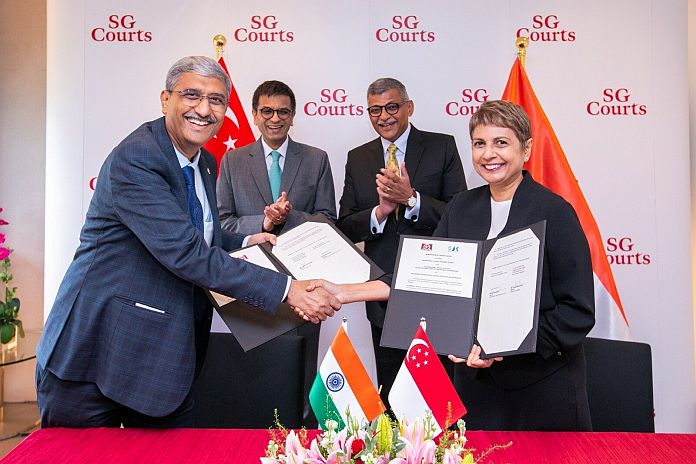SINGAPORE – The judiciaries of Singapore and India have signed two Memoranda of Understanding (MOUs) on 7 September 2023 to promote bilateral judicial cooperation.
The two MOUs affirm the common cause of promoting access to justice and collaboration in judicial education and research between Singapore and India. The scope of collaboration covers judicial education and training, leveraging technology to enhance access to justice, as well as promoting multilateral fora for judicial engagement.
The signing of the two MOUs at the Supreme Court of Singapore was witnessed by chief justice Sundaresh Menon of Singapore and chief justice Dhananjaya Yashwant Chandrachud of India.
The Indian delegation comprising chief Justice Chandrachud and judges were on an official visit to Singapore for the inaugural Singapore-India Judicial Roundtable, which will be held annually following the signing of the MOUs. These meetings serve as a platform to exchange knowledge, discuss mutual areas of interest, and advance collaboration and cooperation between the two judiciaries.
At the opening of the roundtable on 9 September 2023, chief justice Menon, said:
“In the dynamic and interconnected world in which our courts operate today, we will be confronted with legal issues that will prove to be increasingly difficult; will increasingly transcend jurisdictional boundaries; and may increasingly be shaped by developments that go on in other countries. As we navigate this changing world, platforms that allow us to learn from one another’s rich experiences and insights will take on even greater importance and significance; and this Roundtable is well placed to provide an invaluable forum for members of our judiciaries to engage in in-depth discussions on topics of mutual interest.”
Chief justice Chandrachud who also spoke at the opening of the Roundtable, said:
“Beyond the social, economic, and diplomatic ties that bind us, our shared commitment to the rule of law and justice forms the foundation of a strong partnership. In an era of increasing interconnectedness, our judiciaries face evolving challenges. The rapid advancement of technology and the far-reaching influence of the internet have ushered in a new era of complexity that demands our collective attention. It is heartening to see our judiciaries rising to the occasion, not just providing legal direction as we enter a new technological paradigm, but embracing technology to enhance accessibility, transparency, and efficiency within our legal systems.”





